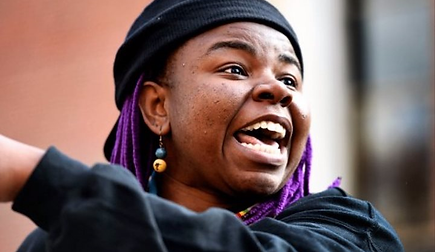COMBAHEE THERAPY


Dr. Montiniquë McEachern
Licensed Marriage and Family Therapist, Ph.D.
Phone:
315-748-5389
Email:
Favorite Color:
Orange
Sun Sign:
Virgo

Meet Dr. Money!
Hey yall! My name is Montinique McEachern, but folks lovingly call me Dr. Money. I am a Black lesbian healer based in what is now called Philadelphia, but is the original home of the Lenape people. Originally from Queens, New York, I am the oldest child of my momma, who raised me and my two siblings with the help of my grandmother and great grandmother. This origin surrounded me with the stories of Black women, so it is no surprise that my therapeutic approach merges Black feminism and Narrative Family Therapy. I feel like I have been sustained and made possible by the stories of the women in my life, lyrics rapped by women in hip hop, and the writings of queer feminist luminaries like Barbara Smith and Audre Lorde. Therefore, my belief on healing is that we must tell our stories- first to ourselves, and then to each other.
In therapy with me, this looks like answering lots of questions, quotes and poems that remind you that you are not surviving wrong, and challenging oppressive narratives about our lives that saturate our personal stories. My goal is always for you to find the power to reauthor, rewrite, or retell your stories in ways that make life feel better than it did before our session. I believe that helping you resist personal, social, and political forces that seek to confine your joy will also help heal our communities. My goal every session is to identify the smallest possible change in how you are thinking, feeling, or responding that will lead to you feeling better.
I have a host of experience as a therapist, both in clinical settings and through holding healing spaces as a grassroots community worker. I began my career in inpatient treatment centers, working with severe mental illness, and have moved through work facilitating teen groups for queer youth, gender affirmation support therapist for Trans folks, and a couple and relationship therapist. My research and clinical work currently centers couples and nonmonogamous relationship therapy for queer folks of color. I developed the first clinical model for working with queer women of color couples with my dissertation project.
While my work primarily focuses on couples and relationships, I am passionate about all intergenerational and identity work with folks who navigate life in the margins. When I'm not therapizing, you can catch me working on my podcast "QueerWOC The Podcast", or collecting crystals for energy work.
Why Combahee
Honoring the Work of the Combahee River Collective

The Combahee River Collective Statement is one of the earliest feminist statements on exploring intersections of oppression. The collective - a group of Black women, many of whom were lesbians - took its name from the Combahee River Raid, an act of resistance led by Harriet Tubman in 1863 that resulted in the freeing of more than 750 enslaved people. Tubman’s raid on the Combahee is the only military campaign in United States history led and conceived by a woman. The CRC is clear that it found its origins in the intergenerational reality of Black women’s struggle for survival and liberation. Similarly, I found my motivation for healing work in the experiences of my own Black queer life, and the desire to help people who lives are disrupted by multiple systems of oppression. I believe that Black feminism has healing implications, and that telling our stories to each other is how we not only begin to heal ourselves, but transform our communities.


Images Credits: (1) The members of the Combahee River Collective march down Massachusetts Avenue, Boston, at a 1979 memorial for murdered women of color.Photograph by Ellen Shub / Courtesy the Estate of Ellen Shub; (2) Members of the Combahee River Collective at the March and Rally for Bellana Borde against Police Brutality, Boston, January 15, 1980. Susan Fleishmann, Gay Community News Photograph Collection
Combahee Therapy exists because I ...
-
Believe deeply in the benefits of politicized therapeutic spaces
-
Believe our therapeutic interventions should challenge the status quo and further progress society
-
As a Black lesbian therapist, I believe in focusing on the healing of those in the margins. Those at the center have much more access to healing spaces than we do.
And because I believe these things, I provide trauma informed relational focused services for Trans and Queer folks of color that have intentional anti-oppression lenses.


